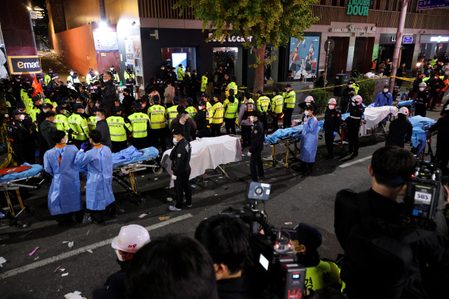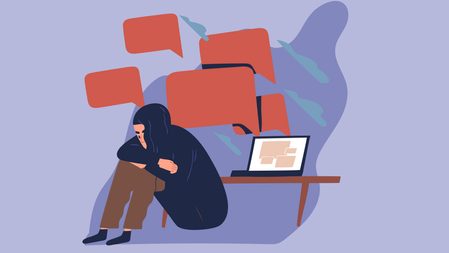SUMMARY
This is AI generated summarization, which may have errors. For context, always refer to the full article.
![[OPINION] e-taewon: How insights from the tragedy could help us make online spaces safer](https://www.rappler.com/tachyon/2022/11/imho-e-taewon.jpg)
No amount of takeaways and lessons learned could compensate for what happened in Itaewon last November 29. Yet we try to learn as much as we can to dampen the sense of futility provoked by the loss of so many lives.
Indeed, lessons are being drawn thick and fast from the incident. An investigation into how the Seoul police responded has been opened, and released emergency call transcripts are being parsed. Crowd management experts have weighed in on how the crowd crush might have unfolded. Some have offered ideas on how similar incidents could be avoided in the future, or how to behave if they could not and you are caught in one. Meanwhile, South Korea’s prime minister has announced that police officers will be posted in subway stations in the capital during rush hour to help manage crowds.
Many of these things would likely be forgotten when the memory of the tragedy begins to fade. It has always been like that: we sit up and take notice when tragedy strikes, then other things happen, and we get distracted and go on with our lives. This is why we must unpack lessons from this disaster and record them, as an aid to memory and as a way of honoring the dead. And we shouldn’t stop at the obvious lessons either. We must dig deeper and search for other truths that might be lurking beneath them.
This, I suggest, is one of them: what happened in Itaewon that night holds lessons for how we manage online spaces. And as in Itaewon, young people, especially women, stand to pay the price if we don’t learn them.
Regulation was lacking, businesses were left to run the show
There seems to be consensus that the police presence in Itaewon that night was no match for the number of revelers who turned up to celebrate Halloween, which had become something of an annual festivity in the area. This was in spite of a meeting of the local council with the local business association and police a few days before the event.
Businesses, by design, aim to turn a profit, and large crowds tend to mean more customer traffic, and therefore, more profits. To leave them in charge of crowd control and management would be counter-intuitive, but that appears to be what happened.
This echoes what we are seeing in online spaces like social media. Big technology companies set the rules of engagement, virtually running the show with minimal oversight. And just as that ill-fated alleyway in Itaewon — narrow, uneven, and funnel-shaped — was conducive to crowd collapse, social media platforms, which attract young people most of all, are designed to draw in crowds, hem them in, and encourage jostling, inevitably crushing some bodies in the process. These bodies are more likely to be female. Women are more likely to be cyberstalked and cyberbullied, to experience online harassment.
Some crowd experts explained that when crowd collapse begins, people caught in the melee are likely to engage in “competitive behavior.” They try to protect their own little space, possibly hurting others in the process. We have seen this in online spaces where basic rules of decency are discarded with the collapse of civil discourse.
People in disguise added to the confusion
That collapse of online discourse often comes courtesy of trolls hiding behind bogus identities.
One of the things that drew people to Itaewon that evening was the elaborate Halloween costumes that have come to be associated with the celebration. Some young people who were interviewed said it was a chance to dress up in ways that were off-limits to them on other days. Others considered it a chance showcase their creativity.
Yet something else that emerged from survivor accounts of that evening is how these costumes might have contributed to the confusion and chaos of that evening. Some people recounted seeing police officers trying to warn them, but not knowing if they were real police.
And it isn’t just the costumes, but what they represented. Halloween was for pretend. It was for tricksters. So, some of the bystanders thought the bodies lined up on the ground, and the people doing CPR on them, were all part of an elaborate Halloween prank. Perhaps it didn’t help that such pranks have become commonplace online.
Disguises, too, have their place in online spaces. Especially when social media like Facebook insist on us using our real identity online, then mine that identity for all its worth, and then use it to sell us things and influence our behavior, assuming a different persona could be a form of resistance.
Unfortunately, there are those for whom taking on bogus identities on the internet is neither about play nor resistance but about sowing discord or scamming others. The challenge is how to tell those characters, the trolls, apart from legitimate users.
Technology cannot substitute for people
I had been in Korea only days before the disaster took place — I even caught my train to Gwangju, where I had a conference to attend, from Yongsan Station, located in the same district as Itaewon. While in Gwangju, I received daily alerts on my mobile phone that said, “Emergency alert: Extreme.” The rest was in Hangeul so I had to ask my husband, a Korean, to translate for me. They turned out to be updates from the police about COVID-19.
Some of the people interviewed in reports about what happened in Itaewon reported receiving such alerts, warning them of dangerous crowding in the area, though too late. And I wondered, to what extent did the idea that they could warn people of danger using such digital tools make the authorities feel complacent enough not to deploy more warm bodies to the area? As digital technologies advance — and Korea is one of the leaders on this score — we could be tempted to outsource everything to technology and forget the importance of actual human presence.
Many of the young people in Itaewon that night might have known this instinctively. The COVID-19 restrictions that kept us siloed from each other for more than two years have brought home the fact that social networking could not substitute for skin-to-skin contact. That online apps could never give us complete access to the range and depth of emotions we experience in the messy midst of our fellow human beings.
Certainly, there are ways in which more technology, not less, could have helped in this instance, for example, in modeling the flow of the crowds. But in the end, what those young people who perished needed was not more technology in the form of alerts or crowd modeling. What they needed was the grownups in the room to set the rules that would help keep them safe, and to be there to make sure they were observed. That, sadly, didn’t happen in Itaewon — it is clear from the witness accounts circulating all over the internet. Now, it is up to us to make sure the lessons we draw from them do not stay there, but are applied IRL. – Rappler.com
Catherine Torres is a writer and development worker. She is doing her MA in Refugee Protection and Forced Migration Studies at the University of London, where her thesis is about the ethics of governments’ digital surveillance of refugees.
Add a comment
How does this make you feel?



There are no comments yet. Add your comment to start the conversation.